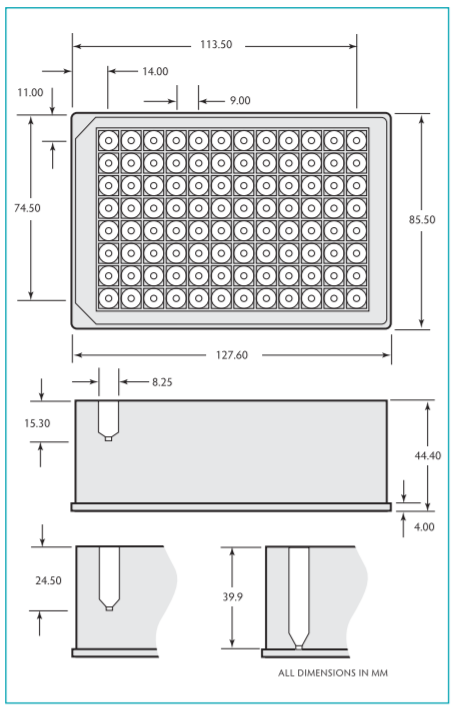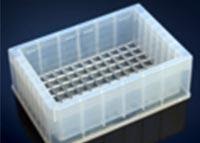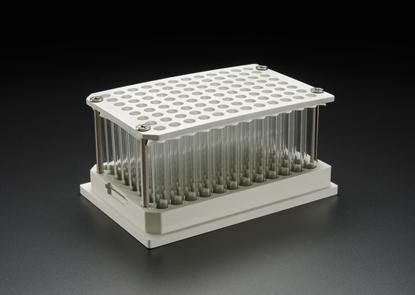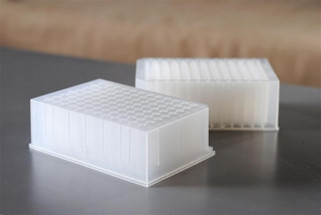Posted by Chrom Tech on 17th Nov 2025
The Different Types of Well Plates: Polypropylene and 96 Well Plates With Glass Inserts
What Are the Dimensions of a 96 Deep Well Plate?
Chrom Tech 96 well microplates are designed according to ANSI/SLAS footprint standards, ensuring compatibility with all leading microplate readers, liquid handling robots, and automation systems. Per ANSI/SLAS specifications, each plate measures 127.76 mm ± 0.25 mm in length and 85.48 mm ± 0.25 mm in width, providing universal platform fit.

Although the footprint remains consistent, other specifications such as height, well geometry, and material composition vary by application. This article highlights the differences between our polypropylene 96 deep well plates and 96 well plates with glass inserts—two trusted formats designed for analytical, life science, and sample preparation workflows.
Chrom Tech Mass Spec Quality Polypropylene Deep Well Plates
Chrom Tech’s polypropylene deep well plates are ideal for sample storage, extraction, and preparation in high-throughput laboratories. Our mass spec quality plates are molded from virgin polypropylene—not recycled resin—and are free of mold release agents or flow additives that can leach into solvents. This makes them perfectly suited for LC/MS and other analytical workflows that demand clean, inert materials.
Unlike standard polypropylene plates used in general-purpose applications, Chrom Tech’s analytical-grade polypropylene ensures low extractables and chemical stability when exposed to solvents such as methanol or DMSO. This is critical when performing extractions or evaporation steps directly within the plate wells.
- Made from 100% virgin polypropylene
- Low extractables for LC/MS compatibility
- DNase/RNase-free manufacturing environment
- No inner well edges — optimized for magnetic bead recovery
- Available working volumes: 350 µL, 1 mL, 1.6 mL, and 2 mL
How Much Volume Does a 96 Deep Well Plate Hold?
Although all 96 deep well plates share the same ANSI/SLAS footprint, the height and internal geometry determine usable volume. Chrom Tech offers 2 mL, 1 mL, and 350 µL formats, all designed for optimal sample recovery and compatibility with robotic handling systems. Each plate maintains an overall height of 44.4 mm, with well depth varying by volume capacity to suit diverse workflow requirements.
Reservoir Trays and Polypropylene Trough Plates

Chrom Tech reservoir trough plates are precision-molded for robotic liquid handling systems and method development workflows. These reservoirs can accommodate single or multiple liquid partitions, with customizable cavity configurations to minimize dead volume.
- Available in 1 to 24 cavity formats
- Container heights: 19 mm to 44 mm
- Constructed from chemical-resistant polymers to ANSI/SLAS standards
- Optional clear or black lids for evaporation control
Reservoir trays are ideal for method scale-up or DoE (Design of Experiments) applications and provide a seamless interface between manual and automated workflows. For technical recommendations, contact our support team.
96 Well Plates with Glass Inserts
Many analytical scientists transitioning from traditional HPLC vials to high-throughput automation prefer a hybrid format that maintains glass contact for their samples. Chrom Tech’s 96 well plates with glass inserts are an economical and versatile solution for this need.
The reusable aluminum plate base and cover hold 96 precision glass inserts—allowing for complete solvent compatibility, minimal adsorption, and high-temperature durability. Inserts are supplied in a plate vial loader, enabling all 96 inserts to be loaded into the plate simultaneously with a single motion.

This system is ideal for extraction workflows, evaporation steps, or heat-based reactions where minimizing sample loss is crucial. The aluminum top is screw-fastened to apply even pressure across the wells, preventing the silicone/PTFE mat from lifting during heating and minimizing evaporation.
Customer Spotlight: OmegaQuant Analytics
“The Chrom Tech team truly is an extension of our team here at OmegaQuant Analytics. They provide a balanced approach in assisting our laboratory with superior chromatography supplies at the best prices. Chrom Tech’s response time is second to none—they carry stock of our routine supplies and can ship the same day. Interacting with their staff feels like getting a local experience with the technical expertise of a specialist. Their passion for customer service and providing analytical solutions is top of the line.”
Lindsey Marshall | Laboratory Manager | OmegaQuant Analytics
Looking for More 96-Well Plate Options?
View the complete lineup of polypropylene, deep-well, glass-insert, and specialty plate formats.
Explore All 96-Well PlatesFrequently Asked Questions About 96 Well Plates
What is the standard size of a 96 deep well plate?
All Chrom Tech 96 deep well plates follow ANSI/SLAS standards—measuring 127.76 mm × 85.48 mm—to ensure compatibility with microplate readers and robotic systems.
When should I use glass inserts instead of polypropylene wells?
Glass inserts are ideal for applications involving aggressive solvents, high temperatures, or analytes that may adsorb onto plastic. They maintain chemical inertness and can be used in reusable aluminum plate systems for high-throughput workflows.
Are Chrom Tech polypropylene plates safe for LC/MS analysis?
Yes. Chrom Tech’s mass spec quality polypropylene plates are manufactured from virgin polymer without mold release agents and are tested for low extractables, making them fully compatible with LC/MS workflows.

